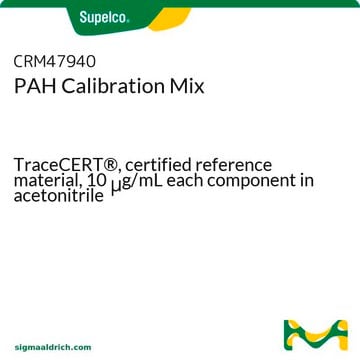49540
Heptafluorobutyric acid solution
0.5 M in H2O, LiChropur™, suitable for ion pair chromatography
Synonym(s):
HFBA solution, Perfluorobutbutyric acid solution
Sign Into View Organizational & Contract Pricing
All Photos(1)
About This Item
Empirical Formula (Hill Notation):
C4HF7O2
CAS Number:
Molecular Weight:
214.04
MDL number:
UNSPSC Code:
12000000
PubChem Substance ID:
NACRES:
NB.21
Recommended Products
description
concentrate
Quality Level
form
liquid
quality
LiChropur™
concentration
0.5 M in H2O
technique(s)
ion pair chromatography: suitable
SMILES string
OC(=O)C(F)(F)C(F)(F)C(F)(F)F
InChI
1S/C4HF7O2/c5-2(6,1(12)13)3(7,8)4(9,10)11/h(H,12,13)
InChI key
YPJUNDFVDDCYIH-UHFFFAOYSA-N
Application
Ion pair reagent for LC/MS
Legal Information
LiChropur is a trademark of Merck KGaA, Darmstadt, Germany
Signal Word
Danger
Hazard Statements
Precautionary Statements
Hazard Classifications
Skin Corr. 1A
Storage Class Code
8A - Combustible corrosive hazardous materials
WGK
WGK 3
Flash Point(F)
Not applicable
Flash Point(C)
Not applicable
Personal Protective Equipment
dust mask type N95 (US), Eyeshields, Gloves
Choose from one of the most recent versions:
Already Own This Product?
Find documentation for the products that you have recently purchased in the Document Library.
Customers Also Viewed
Sławomir Wybraniec et al.
Journal of chromatography. A, 1216(41), 6890-6899 (2009-09-08)
Polar betacyanin pigments together with betaxanthins from ripe cactus fruits of Hylocereus polyrhizus (Cactaceae) were fractionated by means of preparative ion-pair high-speed countercurrent chromatography (IP-HSCCC) also using the elution-extrusion (EE) approach for a complete pigment recovery. HSCCC separations were operated
Marta Llorca et al.
The Science of the total environment, 431, 139-150 (2012-06-12)
Water has been identified as one of the main routes of human exposure to perfluoroalkyl substances (PFASs). This work assessed the presence of 21 PFASs along the whole water cycle using a new fast and cost effective analytical method based
Jan Busch et al.
Environmental pollution (Barking, Essex : 1987), 158(5), 1467-1471 (2010-01-08)
Polyfluoroalkyl compounds (PFCs) are widely used in industry and consumer products. These products could end up finally in landfills where their leachates are a potential source for PFCs into the aqueous environment. In this study, samples of untreated and treated
John L Butenhoff et al.
Reproductive toxicology (Elmsford, N.Y.), 33(4), 513-530 (2011-09-01)
Sequential 28-day and 90-day oral toxicity studies were performed in male and female rats with ammonium perfluorobutyrate (NH(4)(+)PFBA) at doses up to 150 and 30mg/kg-d, respectively. Ammonium perfluorooctanoate was used as a comparator at a dose of 30mg/kg-d in the
Ulrika Eriksson et al.
Environmental science and pollution research international, 20(11), 7940-7948 (2013-04-17)
Diet and drinking water are suggested to be major exposure pathways for perfluoroalkyl substances (PFASs). In this study, food items and water from Faroe Islands sampled in 2011/2012 were analyzed for 11 perfluoroalkyl carboxylic acids (PFCAs) and 4 perfluoroalkane sulfonic
Our team of scientists has experience in all areas of research including Life Science, Material Science, Chemical Synthesis, Chromatography, Analytical and many others.
Contact Technical Service












